'Immigrant mentality' gives Thunderbird student competitive edge
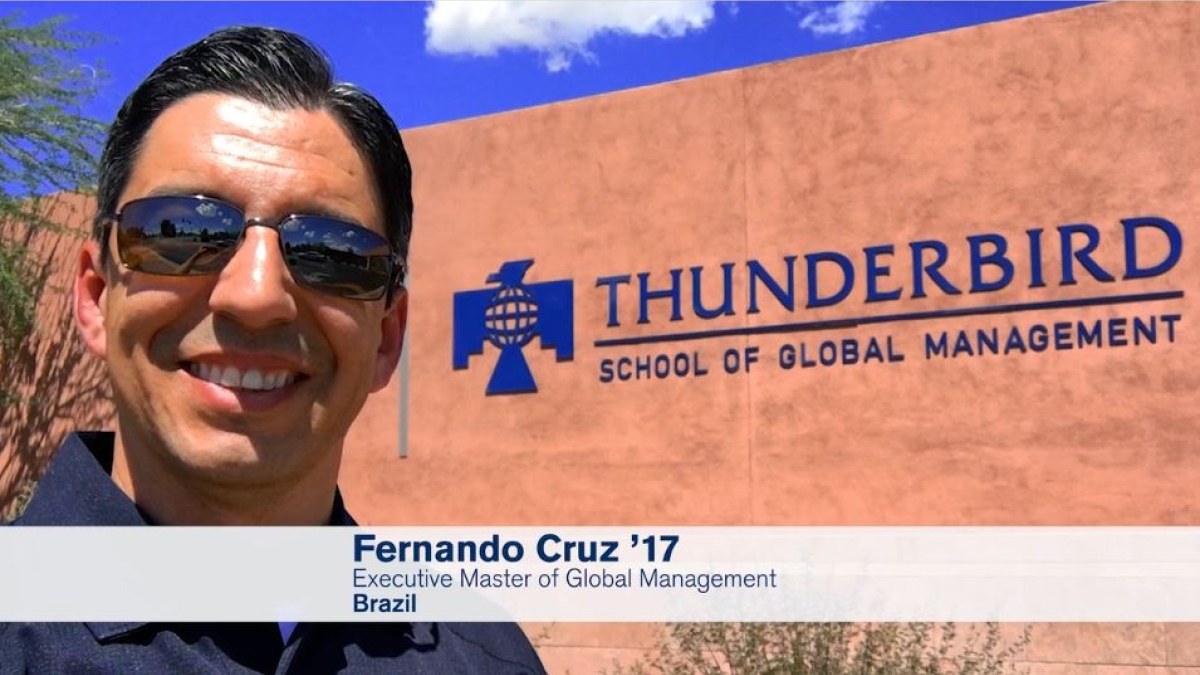
Fernando Cruz '17, Brazil, Executive Master of Global Management
This profile is part of a series highlighting the personal stories and achievements of Thunderbird students. Ready to read more? Subscribe to the Knowledge Network newsletter.
Fernando Cruz credits “the immigrant mentality” — along with his mother — for taking a boy from a Brazilian shanty town, or favela, and turning him into a successful entrepreneur.
“I grew up in a poor family, but I was blessed to have a mom who had a vision for me,” said Cruz, who is pursuing an executive master’s degree in global management at Arizona State University's Thunderbird School of Global Management. “She didn’t have an education past 3rd grade, but she’d say, ‘Education is very important.’”
Hard work was important too. As a young boy, Cruz would help his mom sell water on the beach: “We didn’t have a license or anything, but we had that entrepreneurial spirit.”
He also went door to door in the neighborhood, offering to do odd jobs: “I could’ve been out playing soccer, but this was our mentality. Nothing is given to you, so you always work hard for what you want.”
Cruz relied on that work ethic to graduate from high school. “That was a big thing in our favela,” he said.
But college was out of reach. “I just didn’t have the money,” he said. “So when I came across an opportunity to work in the United States. I said ‘Let’s do it.’
Cruz had been promised a $10-an-hour job as technical mechanic at a soon-to-be launched company. He would draw field plans and work with big machines. “I thought, at $10 an hour, I’ll be a millionaire!”
“Some people said I was crazy, but I had nothing to lose. I lived in a shanty town with crappy jobs and no future,” he said. “If it didn’t work out, at least I’d learn English and I could go back to Brazil and get a better job.”
A change of plans
With $250 in his pocket, Cruz arrived in the United States. Just four months earlier, at age 23, he had married his high school sweetheart, but they were too broke for her to accompany him on the initial trip.
Cruz was excited to chase the American dream.
“In Brazil, you’d hear all about the United States. Hollywood is the best marketing tool,” he said. “When we met Americans, we’d ask them, ‘Do you know Arnold Schwarzenegger? Do you know Sylvester Stallone? Why not? You’re an American!’”
But his new path in the U.S. quickly took a detour: the job Cruz was promised fell through.
“So I started mowing lawns. Then I learned to do snow removal. Then I got a job cleaning restaurants,” he said. “It was tough, because I probably slept only two hours a day. I was going to school to learn English during the day. Then I’d go home, change clothes and mow lawns. Then at night I’d shower and change and go clean restaurants. The next day, I’d go back and repeat. It was like ‘Groundhog Day.’
“But the experience was valuable because it taught me the immigrant mentality,” he said. “You do whatever it takes, working two or three jobs, 20 hours a day if necessary. And that mentality never really goes away — it becomes your competitive advantage.”
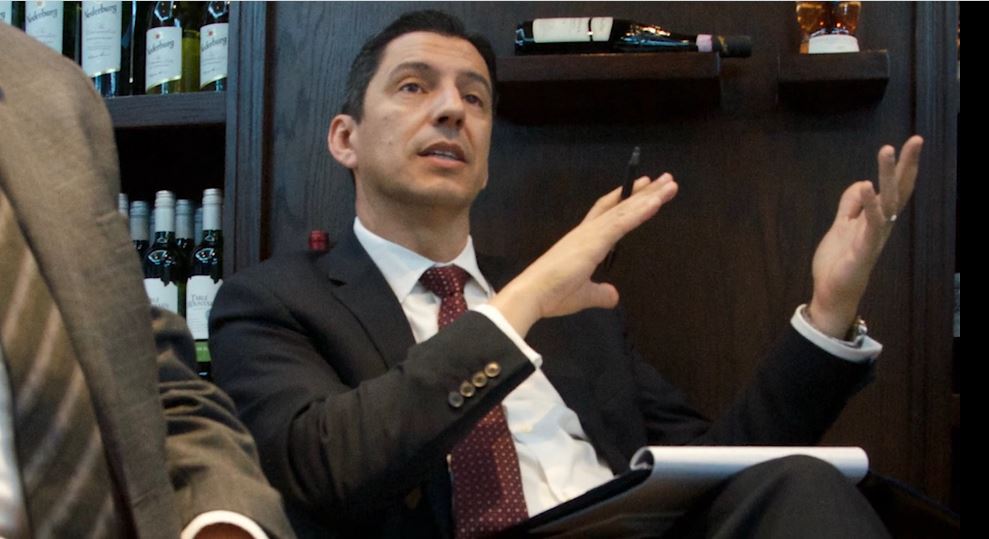
Building a business
The detour didn’t change Cruz’s long-term goals, which were to “go to school, get my master’s, go back to Brazil and get a great job,” he said. “But then an opportunity came. Somebody came to me and said, ‘I want to open a company with you.’ I had never dreamed of being an entrepreneur, to have my own business. But every time I’d close a door, two or three would open.”
Cruz and a friend started a small import-export business and in the first few years tried their hand at solar, janitorial services and even importing granite.
He was a skilled salesman, but the insecurity of sales reminded Cruz of what awaited if he failed: “If you don’t sell it, you don’t make money. And if you don’t make money, you go back to the shanty town.”
But Cruz was making money. The janitorial company, Dynamond Building Maintenance, which they launched in April 2006, hit $800,000 in sales by the end of that year. Two years later, it jumped to $3.7 million.
“It grew like crazy,” he said. “But when the economy dropped in 2008, clients stopped paying and we lost 52 percent of our sales. We had to use our own capital to keep it going.”
That’s when Cruz realized the company needed a new approach. “We had four partners — too many chiefs.” he said. “We changed our strategy and growth goals. We hired dedicated people with a lot of experience. And today, we have a great organization.”
‘Thunderbird was perfect’
Those changes gave Cruz enough breathing room to pursue his master’s degree. A Utah resident, Cruz lives near quality executive MBA programs. But after speaking with Thunderbird alums, reviewing school rankings and doing research, he chose Thunderbird.
“Thunderbird was perfect,” he said. “The executive master’s in global management program really focuses on numbers, and I needed to know how to make decisions based on numbers. My company had plans to go international, and it was important for me to get a master’s that would help me with connections and knowledge.”
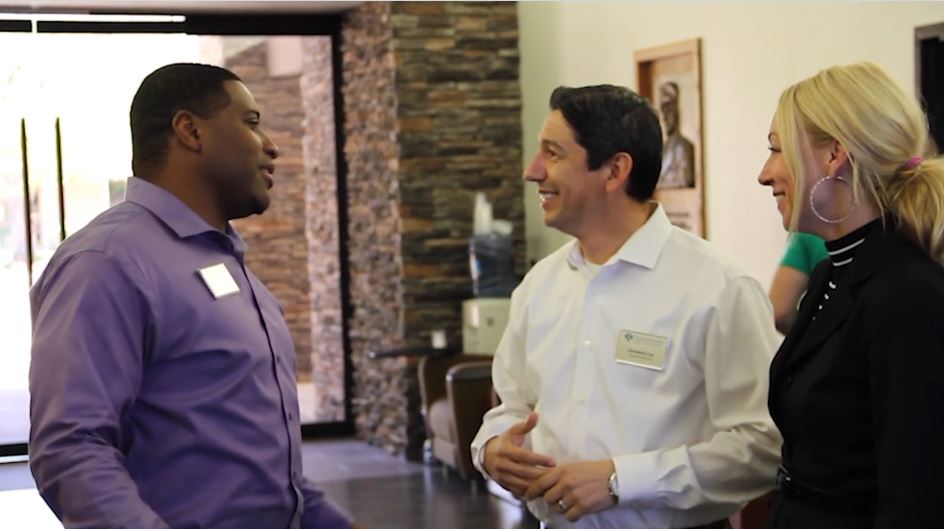
He also points to Thunderbird’s emphasis on systems and cultures. “The tools we get at Thunderbird really help us understand differences. I wouldn’t get that in another MBA program,” he says. “If I’m missing that huge part, then how could I make the best decisions for our employees?”
Cruz gives an example from a recent industry seminar: “I was talking with a supplier and told him what I was studying at Thunderbird. He tried to be funny and asked, ‘How does a global management degree help you in Utah?’ I looked at him and said, ‘In my company alone, we have over 10 countries represented. So, where can you use a global management education? You can use it anywhere.’”
Now that he’s in the program, Cruz is impressed with Thunderbird’s influential network. “It’s mind-blowing,” he said. “For example, I just met Carlos Neuhaus from Peru. He’s the CEO of the Pan-American Games in 2019. And he is a Thunderbird alum.”
Cruz knows he has come a long way from his favela, and he has advice for other budding entrepreneurs: “I never forgot where I came from. Don’t give up. You’re going to have bad days, but just keep working and keep pushing. It’s amazing to see the journey.
“Money is great, but it’s not everything. It’s what you do with it,” he said. “My organization could stop growing right now and I’d be fine for the rest of my life. But I want to create something special. So with all these influential contacts, I’m always thinking ‘ How can we help each other?’We can use our network to do something good.
“December feels really far away,” he laughed, “but after graduation, it’s going to be a real honor to say I’m part of this family — I’m a Thunderbird alum.’"
More Business and entrepreneurship
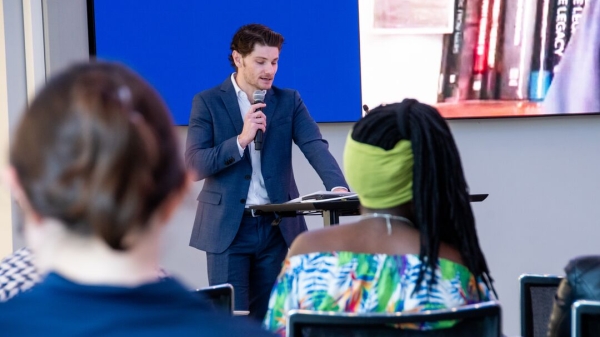
California roots, global impact: Thunderbird at ASU grad's journey in global management
Editor's note: This story is part of a series of profiles of notable spring 2024 graduates. Lake Forest, California, native…

ASU student entrepreneurs win cash investments for ventures at Demo Day
Several Arizona State University student entrepreneurs who won big cash investments for their ventures on Saturday expressed…
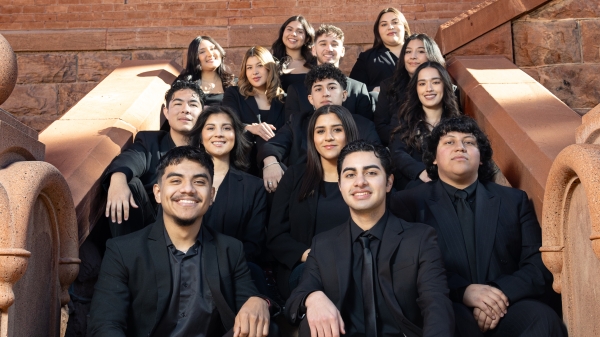
Hispanic Business Students Association marks half a century of impact, growth
When Michelle Macias, a native of Yuma, Arizona, became a business entrepreneurship and management student at Arizona State…